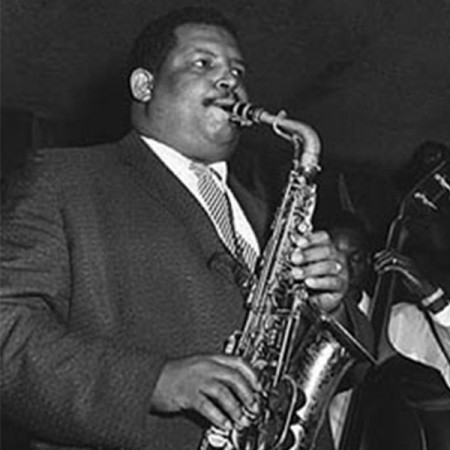
Cannonball Adderley
(Photo: DownBeat Archives)There have been several group discussions transcribed in the course of jazz journalism. Most of them have been published during the last few years. On the whole, these discussions have brought together men holding opposing ideas, musicians with similar problems, or philosophers concerned with weighty problems facing jazz.
There has not been, at least to my knowledge, an attempt to capture through group discussion that illusive human bond that makes a given number of musicians in a group, or a compound, as opposed to an aggregate of players. This was one of the reasons for this discussion. It deals, for the most part, with men instead of ideas.
It was, to a great degree, an undirected, five-way interview—or, rather, four-way—since Cannonball Adderley, who was not scheduled to be included originally, dropped in during the first part of the conversation and stayed only a few minutes.
The atmosphere of the discussion was as relaxed as possible. The men—bassist Sam Jones, drummer Louis Hayes and pianist Victor Feldman—gathered in trumpeter Nat Adderley’s hotel room one afternoon last February during the group’s engagement at Chicago’s Birdhouse.
DownBeat’s Don DeMicheal posed the question of religiosity in jazz—not meaning the current Gospel-style rage—but the origin of the ability to play jazz, or any other kind of music. Is there something beyond us that guides our hand, so to speak?
Nat Adderley: I don’t think I fully understand the question. … As a matter of fact, I never even thought of it. I’ve been so busy trying to play, trying to think of something to play and when to play it that it never occurred to me to think one way or the other about where it was coming from. Personally, I never thought about it.
DeM: What about you, Sam?
Sam Jones: I never though about it either. I’ve been trying to play the ax, play my instrument.
DeM: Louis?
Louis Hayes: I think it comes from within. If you get a chance to play, whatever is within comes out.
DeM: How did it get there?
Louis: From environment. Hearing things, hearing different people. And you develop a thing from that.
Victor Feldman: Was your family musicians, besides your brother?
Louis: Uh-huh.
Vic: You mean it goes back in your family? Then it’s inherent, too.
Louis: You can inherit the whole thing. As long as you’re born where there’s jazz.
DeM: How can you inherit the ability to play jazz?
Louis: I don’t think you can inherit an ability to play jazz.
DeM: What about musical ability?
Louis: I think you can inherit musical ability.
DeM: And it comes out in whatever form you happen to be thrust into environmentally?
Vic: You might be right. … At the same time, the people who started that subject seem to have come to two conclusions: it’s partly … in fact, a lot of it is environment, but there’s something about it that is hereditary, too. I think partly both.
DeM: Nat, you were a sociology major, what do you say?
Nat: I thought about this thing before. But strictly on a racial level.
DeM: What about the racial level?
Nat: I don’t think anybody is better qualified in the medium solely because of race. However, I do find certain inherent qualities that seem to be more natural to Negroes than to white musicians. This thing seems to me to be environmental, rather than inherited or a group characteristic or an in-group thing. Theory, though, is only so good. What is it? About 90 percent correct? You can’t make a broad generalization, but this is what I believe.
First of all, when I think about my own background, and I have the same background as my brother, then I know why we happened to get into jazz. I know why we happen to play the way we do. I don’t know what anybody else’s background was, what their environment was, but I do know that in order for us to go to elementary school, we had to go past a section of town that was called the juke-joint section. When you go past these joints in the morning, they’re all closed. But when you’re coming home in the afternoon, they’re all blasting out with the blues. T-Bone Walker, Muddy Waters, and the blues singers of the day. You come by there every day and you learn these tunes—they’re playing the same tunes every day.
When you go to a dance when you’re a little older, the band is playing these kinds of tunes. When the old man used to take us to see big bands, he took us to see Jimmie Lunceford and Andy Kirk, I remember. This is what we grew up on. When we eventually bought records, these were the kinds of records we bought. First record we ever bought was a Coleman Hawkins record.
Probably another musician, who was a white musician, living somewhere else, maybe his old man was a Paul Whiteman fan, if he liked jazz at all. Maybe he didn’t like jazz. And this kid not having to walk through the juke-joint section and not ever hearing this kind of music, might never have had the occasion to enter jazz until maybe he went to college and studied classical music and then discovered jazz. He has already developed this classical technique, so that when he came into jazz, he came in through another door. Not the door I came in, because I came in through the door with T-Bone Walker and these people.
I don’t know. … History will say which is better. Maybe he’s got the better of it. But I do believe that the feeling I would put into a particular composition would probably have more jazz feeling for now than what he would put into it, for he wouldn’t have the background that I have. I shouldn’t have used myself in the example, but that’s the only one I really know.